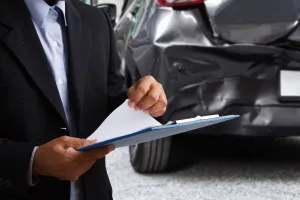Your First Call: What a Car Crash Law Firm Needs to Know
- account_circle admin
- calendar_month Sel, 2 Sep 2025
- visibility 330
- comment 0 komentar

Your First Call: What a Car Crash Law Firm Needs to Know
Your First Call: What a Car Crash Law Firm Needs to Know to Build Your Case
KlikBabel.com – Your First Call, What a Car Crash Law Firm Needs to Know. The moments after a car crash are a blur of confusion, stress, and adrenaline. Once the immediate crisis has passed and medical needs are addressed, your next crucial step is often a call to a car crash law firm. This initial consultation is more than just a conversation; it’s the foundation of your potential personal injury claim.
Being prepared for this call can significantly impact its effectiveness. A law firm needs specific, detailed information to accurately assess the viability of your case, determine liability, and estimate potential damages. The more organized you are, the clearer the path forward becomes. Here’s a comprehensive guide to the essential information a car crash law firm needs to know during your first call.

1. The Core Details: The “Who, What, When, and Where”
Every case starts with the basics. Your attorney will need a clear picture of the fundamental facts of the incident. Be ready to provide:
- Date and Time of the Accident: The exact date and approximate time are critical for establishing timelines and accessing official reports.
- Location of the Crash: Provide the specific street names, intersection, city, and state. If it was on a highway, note the direction of travel and the nearest mile marker or exit.
- Parties Involved: The full names, contact information, and insurance details for all drivers, passengers, and pedestrians involved in the accident. If you don’t have all this, provide what you do have.
2. The Narrative: How the Accident Unfolded
This is your opportunity to tell the story from your perspective. Don’t worry about using legal terms; just explain what happened as clearly as you can. Your lawyer will be listening for key details that help establish fault. Consider these points:
- What were you doing just before the crash? (e.g., driving straight, turning left, stopped at a red light).
- What did you see the other driver do? (e.g., run a stop sign, swerve into your lane, rear-end you).
- Weather and Road Conditions: Were the roads wet? Was it foggy or dark? Were there potholes or construction?
- Your Immediate Recollections: What did you hear or feel? Did the other driver say anything incriminating, like “I’m so sorry, I was texting?
3. The Immediate Aftermath: Police and Witness Information
Official documentation and third-party accounts are invaluable. Your law firm needs to know:
- Police Involvement: Did law enforcement respond to the scene? If so, provide the name of the agency (e.g., city police, state highway patrol), the responding officer’s name and badge number, and the police report number. This report is one of the most crucial pieces of evidence.
- Citations Issued: Was anyone ticketed at the scene? A traffic citation issued to the other driver can be powerful evidence of their negligence.
- Witnesses: Did anyone see the accident happen? If you were able to get their name and contact information, have it ready. Independent witness testimony can make or break a case.
4. The Human Cost: Documenting Injuries and Medical Treatment
A personal injury claim is centered on the harm you suffered. Your attorney must understand the full extent of your injuries to calculate damages. Be prepared to discuss:
- All Injuries: Detail every injury, no matter how minor it seems. This includes everything from whiplash and back pain to cuts, bruises, and concussions. Symptoms can appear days or weeks later, so mention anything new.
- Medical Treatment Received: List every medical provider you have seen since the accident. This includes the ambulance, emergency room, your primary care physician, specialists, chiropractors, and physical therapists.
- Future Medical Needs: Has a doctor recommended future surgeries, ongoing therapy, or long-term care? This is a critical component of your damages.
5. The Financial Impact: Insurance, Vehicle Damage, and Lost Wages
The accident has likely caused significant financial strain. Your law firm will need to gather information on all economic losses.
- Insurance Communications: Provide details about your own insurance policy. Importantly, mention any conversations you’ve had with any insurance adjuster, especially the other driver’s. It’s best to avoid speaking with the at-fault party’s insurer before consulting an attorney.
- Vehicle Damage: Describe the damage to your car. Do you have photos or repair estimates? Is the car considered a total loss?
- Lost Income: Have you missed work because of your injuries? Your lawyer will need to know your employer’s name, your job title, your rate of pay, and the number of days you’ve been unable to work.
By gathering this information before your first call, you empower the car crash law firm to provide a thorough and accurate case evaluation. It transforms a stressful call into a productive first step toward securing the compensation you deserve.
Frequently Asked Questions (FAQ)
1. What if I don’t have all of this information for the first call?
That’s completely okay. The aftermath of a crash is chaotic, and it’s rare for someone to have every single piece of information immediately. The most important thing is to call as soon as you are able. Provide the details you have, and your legal team can use their resources—including investigators—to help you obtain the rest, such as the official police report, witness statements, and insurance details.
2. How much does it cost to talk to a car accident lawyer for the first time?
Nearly all reputable personal injury and car crash law firms operate on a contingency fee basis. This means the initial consultation is completely free, and you pay no attorney’s fees unless they win your case. This allows you to get expert legal advice and understand your options without any upfront financial risk.
3. Should I talk to the other driver’s insurance company before I call a lawyer?
It is highly recommended that you do not speak to the at-fault driver’s insurance adjuster before consulting with an attorney. Adjusters are trained to ask questions in a way that can minimize their company’s liability. They may try to get you to admit partial fault or record a statement that could be used against you later. It’s best to politely decline to give a statement and refer them to your lawyer.
- Penulis: admin












Saat ini belum ada komentar